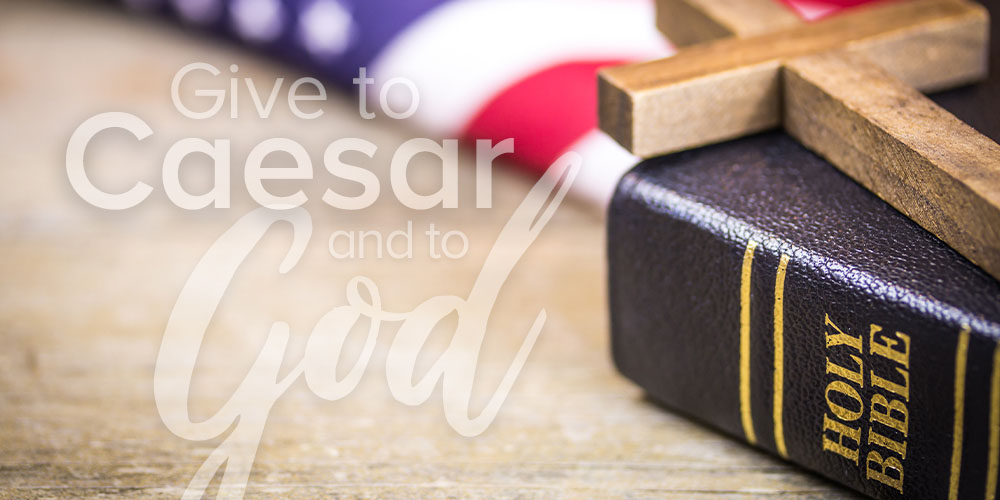 |
As Christians, our first allegiance is to God, but we also owe the government obedience, honor, and respect.
A few weeks before last fall’s election, a homemade sign on a country road caught my kids’ attention: “Who would Jesus vote for?” The rest of the signage on the property made clear the owners’ answer.
Jesus did not live under a democratic system like ours. If he had, it would be easy to imagine someone asking him during an election season, “Teacher, whom do you support?” How might he have responded? Speculating is dangerous. Perhaps he would have responded as he did to many other questioners—not with the kind of answer they wanted but with the one they needed.
Two such instances from Jesus’ ministry can give us what we need to hear today.
Loving our neighbor
Consider the time the law expert asked Jesus what to do to inherit eternal life (Luke 10). Jesus answered with a question: “What is written in the Law?” The man answered appropriately: “ ‘Love the Lord your God with all your heart and with all your soul and with all your strength and with all your mind’; and, ‘Love your neighbor as yourself.’ ” Jesus said he was right. Then the man asked, “And who is my neighbor?” Jesus went on to tell the story of the Good Samaritan, confronting the man with the hard truth: Our neighbor is anyone, regardless of race or background, who needs our help.
During an election, we remember that all our fellow citizens are our neighbors who need our help. So, we weigh candidates and policies and make decisions that we believe will show our love to God and neighbor. Easy answers are rare when choosing among sinful human beings, but each election is an opportunity for Christians to please God by seeking the good of their neighbor with their choice.
It doesn’t get easier when the election is over. Then the question becomes how we continue to live as Christian citizens. This can be challenging for those who are disappointed in the election results and for those who are not. Another question-and-answer session with Jesus gives us direction.
Being a member of two kingdoms
Some religiously minded Pharisees and politically minded Herodians tried to trap Jesus with a question about the imperial tax: “Should we pay or shouldn’t we?” (Mark 12:15). Jesus asked whose image was on the denarius. “Caesar’s,” they said. He replied, “Give back to Caesar what is Caesar’s and to God what is God’s.” Rather than give the easy answer, he taught his listeners—and us—about life in the two kingdoms.
We give to Caesar what is his because God has placed him over us.
We Christians are members of two kingdoms. By virtue of our baptism, we are citizens of Christ’s heavenly kingdom. To God we owe our love with all our heart, soul, strength, and mind. Moved by his love for us in Christ, we give back to God what is rightfully his.
By birth or naturalization, we are also citizens of a political entity. To its leaders we owe something too. Being citizens of heaven doesn’t exempt us. In fact, it gives us even more reason to comply. Paul says, “There is no authority except that which God has established” (Romans 13:1). So, we give to Caesar what is his because God has placed him over us.
Giving what we owe
What exactly do we owe to “Caesar”? First, we owe our obedience. “Let everyone be subject to the governing authorities” (Romans 13:1). This means obedience in things big and small. It means obedience whether we agree with the law or not. Paul reminds us, “It is necessary to submit to the authorities, not only because of possible punishment but also as a matter of conscience” (Romans 13:5).
Consider this current example. If the authorities require face masks, Christians will want to wear them—whether they think they need them or not. Paul says that we obey government because we obey God. Peter agrees: “Submit yourselves for the Lord’s sake to every human authority” (1 Peter 2:13, emphasis added). Note also how he continues: “It is God’s will that by doing good you should silence the ignorant talk of foolish people” (v. 15). Those who see Christians as aloof or hypocritical might accuse us, “You say you care about life, but you won’t wear a mask to protect mine?” We can silence that criticism quite easily—and show concern for our neighbors. More important, by obeying the government, we are obeying God.
Jesus also affirmed that the government has a right to collect money from its citizens. Paul mentions the same thing—and more. “Give to everyone what you owe them: If you owe taxes, pay taxes; if revenue, then revenue; if respect, then respect; if honor, then honor” (Romans 13:7).
The first two may not be so difficult. If you don’t pay your taxes, you face penalties. But what about respect and honor? These things are sorely lacking in the civic arena—sadly, among Christians too.
Consider the way you speak about the government in your home. Does it reflect proper respect for the people God has placed over you? We can disagree with someone without disrespecting them. We can also recognize the good done by those with whom we disagree. To vote for one candidate does not mean to be against the other candidate in everything. Christians can see—and acknowledge—the good that leaders do, even while speaking against the bad.
Finally, we owe the authorities our prayers. Paul writes, “I urge, then, first of all, that petitions, prayers, intercession and thanksgiving be made for all people—for kings and all those in authority, that we may live peaceful and quiet lives in all godliness and holiness” (1 Timothy 2:1,2). In our churches and our homes, we ought to pray for our leaders. We can pray for them by name and ask God to bless them, even if—perhaps, especially if—we didn’t vote for them. As God blesses the earthly kingdom to which we belong, we can go about the work of his heavenly kingdom in peace.
But what if the earthly authorities don’t share our beliefs or values? Remember that our obedience and respect are not conditioned on their character or our agreement with their policies. The authorities in Jesus’ day included the pagan Caesar and the spineless Pilate. The emperor when Peter and Paul wrote was likely the corrupt and murderous Nero. But if the government should order us to do something contrary to God’s will? Then, and only then, we must disobey. But even then, we do so with respect.
How do we live as Christians in our democratic country? “Give back to Caesar what is Caesar’s and to God what is God’s.” That means giving obedience and respect to the governing authorities and placing our trust in the King of kings.
More helpful than asking what would Jesus do is remembering what he did and still does. He respectfully submitted himself to punishment for our disrespect. His perfect obedience stands in the place of our disobedience. Now he rules over every power and authority. Confident in his forgiveness and his power, we gladly give to Caesar what we owe him and, as we do, give to God what belongs to him.
Author: Samuel Degner
Volume 108, Number 2
Issue: February 2021







